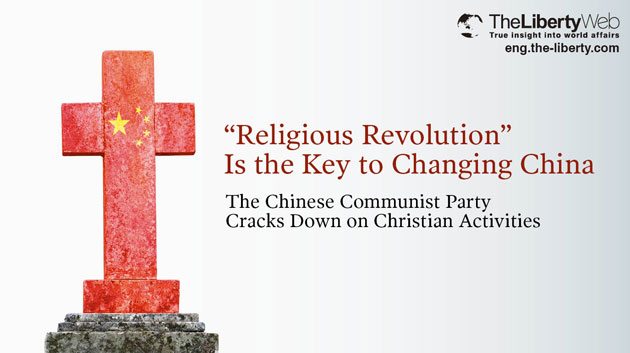“Religious Revolution” Is the Key to Changing China
The Chinese Communist Party Cracks Down on Christian Activities
The Chinese Communist Party, which has cracked down on domestic religious activities, is starting to tighten its grip on Hong Kong where religious activities are less restricted, the August 26th edition of The New York Times reported.
Rev. Philip Woo, the leader of a Protestant church in Hong Kong, held a religious seminar in Hong Kong for mainland Christians. Then, he was summoned to the State Administration for Religious Affairs across the border in the city of Shenzhen. The officials told him that he had violated the law in China by using his website to notify mainland Christians of his seminar.
According to the article, Mr. Woo was startled when he was called to the mainland authorities because he had not violated the laws of the Hong Kong Special Administration Region. Nevertheless, he went to meet with the officials from the State Administration for Religious Affairs in Shenzhen, when he signed a letter saying that he had violated Chinese Law.
China Will Be Home to the Biggest Christian Population in the World
Christianity has now become the largest religious force in China with about 70 million believers. Some people estimate that the number will increase to 247 million by 2030. If so, China will overtake the U.S. as home to the largest number of Christians in the world. As seen in Mr. Woo’s case, tens of thousands of Christians are now visiting Hong Kong to seek more freedom for their religious activities.
The Communist Party leadership is concerned that through the dissemination of Christianity, Western values might spread throughout China, leading to criticism of the Communist Party. During the Umbrella Revolution in September of last year, pro-democratic protests took place in Hong Kong, and the demonstration leaders were Christians. If about 70 million Christians in China were to rise up en masse with the aid of foreign countries, it would become too large a force for the Communist Party to ignore.
After May of this year, the Chinese authorities stepped up efforts to crack down on underground or unofficial churches in the Zhejiang province where people exercise their faith in Christ fervently. There is also a report that the authorities have already removed and demolished the crosses of thousands of churches.
China’s Policy to Suppress Religious Freedom Has Received Criticism from Home and Abroad
Behind the Chinese authorities’ crackdowns on religious activities is the idea of the Ekisei Revolution, an ancient Chinese political concept that when the incumbent emperor is found lacking in moral virtue, Heaven decrees a change of dynasty through religious-based revolution. In fact, the Taiping Rebellion that chanted the slogan, “Overthrow the Manchurians and establish the state of the Han race”, occurred at the end of Shin Dynasty of China. Historical events in which such religious revolutions have evolved into political revolutions and then have overturned dynasties have repeatedly occurred throughout Chinese history.
China is now facing various crises such as the plunge in Shanghai stock prices, serious environmental pollution problems, and the massive explosions at the warehouse of the port of Tianjin. Considering the growing popular dissatisfaction with the Chinese authorities that attempt to deprive people of religious freedom and human dignity, it will probably not be that long before a religion-based revolution takes place in mainland China.



















